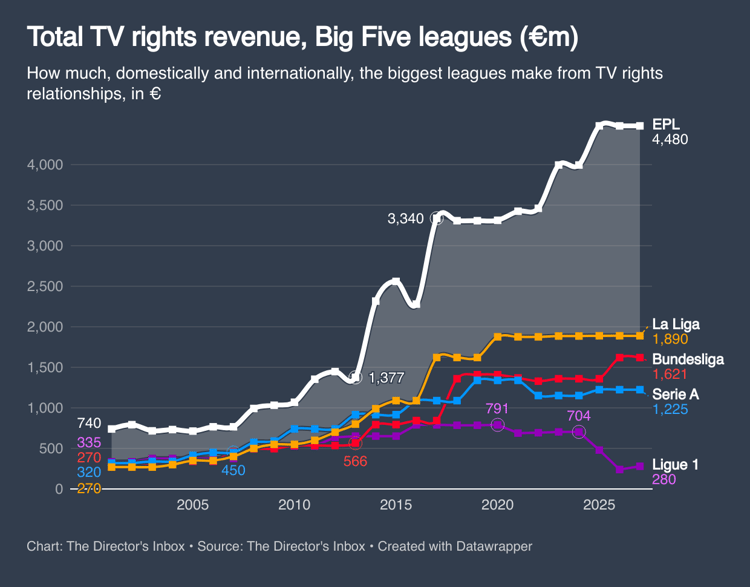-
Nieuws
- 51 minutes ago
Explained: Why Premier League clubs are divided over FFP revolution

Premier League clubs will vote on new Financial Fair Player (FFP) regulations coming into force that could change the landscape of England’s top-flight.
These are not without criticism, with the Professional Footballers’ Association (PFA) joining forces with the likes of Manchester United and Manchester City in showing their dissent to the new proposals, which could come into force at the beginning of the 2026/27 campaign.
Clubs will effectively be given two options when they vote on 21 November:
- Stick with the current Profit and Sustainability Rules
- Impose a squad cost ratio (SCR) alongside top-to-bottom anchoring (TBA)
But what impact would the new system have, and why is it such a controversial topic?

Why Premier League clubs want new FFP rules
Premier League CEO Richard Masters has told Sky Sports that some clubs are concerned that they are having to balance FFP on two different playing fields. While the Premier League has its own set of rules, UEFA has a different set for European competition.
The aim is to find a better alignment between the two.
He explains: “We've done probably a year's work with internal working groups and talking to clubs about developing a new system. The principal starting point for that was alignment with UEFA, so our current PSR rules were aligned broadly to the FFP rules of UEFA when they were brought in.
“We came second and brought them in and they were the same. So, clubs that are operating in dual systems coming in and out of Europe don't have to operate on entirely different systems. So, there's continuity of financial planning and that was the principal driving force between looking at what we call squad cost ratio, which is what is implemented in Europe.”
What the Premier League’s squad cost ratio means for clubs
Squad cost ratio (SCR) has been imposed by UEFA since 2023 and limits how much clubs can spend as a percentage of their earnings.
Under UEFA’s legislation, clubs can spend 70% of their revenue on their squads, which includes transfers and wages.
The Premier League is proposing that its clubs in Europe follow this rule, but clubs that do not have continental football can spend up to 85% of their revenue on their squads.

Why do non-European clubs have the opportunity to spend more money? Simply because they are missing out on the lucrative income that playing in the likes of the Champions League can bring and, therefore, it is seen as a way to balance out competitiveness.
One advantage of this system is that clubs are not studied by looking at past results. Instead, they are given a clear budget that they should stick to each season. This is revised each year.
Explained: How top-to-bottom anchoring could change Premier League spending
Since spending power is tied to revenue under SCR, how could smaller teams catch up? The answer lies with top-to-bottom anchoring (TBA), which is designed to retain a sense of competitiveness across the league.
Running in parallel with SCR, it will offer a further cap to spending based on the central income of the league’s lowest-earning side.
Central income is derived apart from other revenue. It entails prize money and television rights, which is divvied up on an annual basis by the Premier League.
The exact details of this have not been thrashed out, but the talks have been based around 5x the lowest-earning team’s central income.

TBA will provide a definitive spending cap. So if the club ranked bottom in earnings of the Premier League were to earn £100m in central income, no team could spend more than £500m even if their SCR budget was higher.
During the 2023/24 season, Sheffield United finished bottom of the league with revenue of around £110m, which would limit the spending of any club to approximately £550m.
Premier League’s proposed punishments for FFP rule breaches
Clubs who breach the rules on multiple occasions will be handed a six-point penalty, according to BBC Sport, which adds that for every £6.5m of overspend, another point will be taken off.
It should be noted that this is only a proposal for now.
PFA hits out at Premier League salary cap plans
The PFA has expressed concerns over the TBA model, suggesting that it will restrict the wages of players.
PFA chief executive Maheta Molango said: “We have a tendency in football to think that we're above the law, but football is not above the law, and unfortunately the reality is you cannot artificially cap someone's ability to make a living.
“There are ways to agree on things around financial sustainability, but this cannot be imposed unilaterally.”
The Premier League responded via a statement: “We disagree with the PFA's views regarding the proposed financial rules and the extensive consultation process we have been conducting.
“The PFA has had numerous opportunities since March 2024 to provide feedback on, and shape, the proposals...Where the League has received feedback...including the PFA, we have considered it carefully and, where appropriate, incorporated it into formulating the draft rules.
“It is our objective to maintain the Premier League's value, competitive balance and ensure clubs operate in a financially sustainable way.”
When Premier League clubs will vote on new FFP rules
Premier League clubs are set to vote on the proposals on 21 November, but despite BBC Sport reporting in February that there was a broad consensus that a deal could be struck, the latest indications are more pessimistic.
“If a vote is not called, or fails to pass, the chances of any new system being introduced by next season will fall away,” The Guardian reports.
TBA appears to be the primary sticking point. Manchester United and Manchester City have been reticent about this proposal in the past. Last year, 16 clubs voted to conduct a detailed analysis of the system, with the two Manchester clubs and Aston Villa voting against it, concerned about not being able to compete in Europe.

Man Utd owner Sir Jim Ratcliffe has been particularly outspoken on the subject, declaring: “TBA inhibit the top clubs in the Premier League, and the last thing you want is for the top clubs in the Premier League not to be able to compete with Real Madrid, Barcelona, Bayern Munich, PSG - that's absurd.”
City, meanwhile, would have been close to breaching TBA last season if it had been in force, the BBC reports.
The emotive subject of FFP is set to divide the Premier League no matter the outcome of the vote, yet the fallout is set to be felt across England’s top flight.
The FootballTransfers app
Check out FootballTransfers' new app for all of football's big storylines, transfer rumours and exclusive news in one convenient place directly on your mobile device.
The FootballTransfers app is available in the Apple App Store. Download here:



















